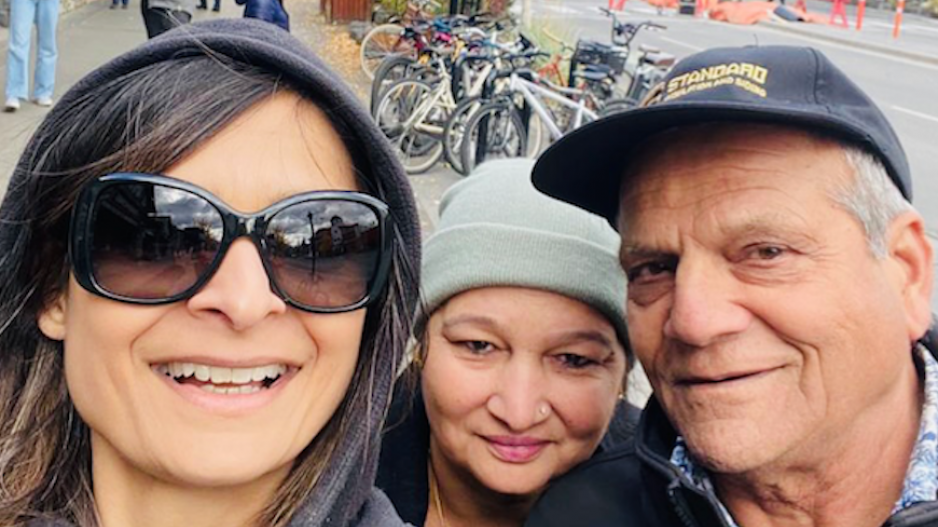WestJet, congratulations on 27 years. Your vibrant teal, competitive rates and world’s friendliest crew had me at hello.
Sadly, a flight from Calgary to Vancouver changed things.
The passenger involved would ask that I stop writing this piece because, like me, he cringes at the thought of “crying victim.”
But this has nothing to do with wokeness.
I took my dad and his wife to Banff, a significant trip for reasons dating back 56 years when he settled in Canada, only $7 in his pocket and a scant village education. He immediately taught himself English to integrate.
He laboured, paid taxes and wore the hand-me-downs of a neighbour’s deceased son. He never sought government support, instilling in us: “God helps those who help themselves.”
Even though we had little, he helped others less fortunate – community service that earned him an Order of BC and Queen Elizabeth II Diamond Jubilee Medal.
By retirement, he hadn’t amassed much and lost Mom relatively young.
Banff was Dad’s first trip in countless years, our first trip together in 30 years and the first time I hosted him, a man who never experienced luxury.
I booked emergency-row seats for priority boarding and legroom. We stayed on the Fairmont Hotel’s gold floor, a showstopper for Dad who remarked that the Banff experience was heaven, a dream, the best trip of his life. It was indeed my honour.
We wore smiles settling on our flight home, he at one emergency window, me at the other. And then came your flight attendant, Gillian.
Without a greeting or smile, she brashly asked Dad: “Sir, do you speak English?”
I shot forward to see Dad sheepishly looking at passengers looking at him – a fit, proud 77-year-old man in jeans, a sweater and a cap, portrayed with a single question as a potential liability in an emergency due to a non-existent language barrier.
Gillian berated him: “Are you paying attention?”
He replied: “Yes.”
She continued: “You’re looking around. I need you to pay attention. Can I give you instructions in English?”
That’s a much different question but still missing context.
When Gillian turned to brief me, I pre-empted her: “How dare you speak to my father so rudely and ask him if he speaks English.” I schooled her on Canada’s requirement to ask passengers if they want the emergency briefing in English or French, an appropriate question.
Gillian countered: “I don’t appreciate being accused of treating people differently.” But that was proven when she didn’t ask the question of the white man next to my father.
She continued: “Will your problem with me affect your use of this door because if it will, we are going to have to figure something out.”
Now I was portrayed as a risk.
During the flight, I tried dismissing the matter because “we are no victims,” but she had humiliated my father. I approached the supervisor to explain how Gillian’s question was discriminatory and strayed from industry requirements. I gave her an opportunity to make it right by apologizing to him.
She could have ended it, but she didn’t.
And WestJet, I could have gathered a Twitter mob with a post, including the recording I made for my protection. Instead, confident in your sincerity, I filed a formal complaint.
I made zero demands for money or freebies. That’s not how I roll. My intention was to flag the matter to correct the record about my father – if only to make myself feel better – and provide you an opportunity to correct Gillian’s slight of your brand by training her.
Your response was inadequate, providing a teachable moment for other organizations.
It has been said the public owns our brands. That’s the lens through which I manage customer issues for clients. I assess people’s credibility and claims and respond accordingly, just like employers do background checks or judges assess witness testimony.
If a client investigates a matter, we gather facts and evidence. That’s the only way our words, actions and decisions have meaning.
Along with what transpired, my complaint mentioned my contemporaneous notes and recording. Your customer support team responded: “WestJet takes claims of discrimination seriously” and mentioned “internal investigations.”
Wait. You investigated and nobody spoke to me, nor requested my tangible evidence?
The email claimed “executives have been made aware” of my complaint and that customer support was “pleased to reply on their behalf.”
Executives should never allow a junior department to speak for them about a matter they supposedly “take seriously.” After all, this wasn’t a case of a cancelled flight. Serious matters require senior response. I am not suggesting you accept liability. In fact, you should not at that point. But clear, honest communication goes a long way.
Let’s agree that my complaint was neither escalated, nor investigated.
Your inadequate and unconvincing response prompted a story in which you don’t control the narrative. Another lesson.
Gillian’s assumption and your response took the shine out of an airline that always demonstrates a human touch.
While our trip ended on a low, Dad probably forgot the negative experience because he may be the kind of immigrant who comedian Hasan Minhaj describes as accepting microaggressions as the perpetual “cost of entry” for a better life.
That may be a column for another time.
Renu Bakshi is a former long-time journalist who now works as an international crisis manager and media trainer. She can be reached at [email protected].




